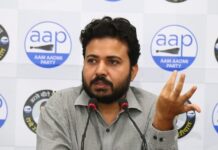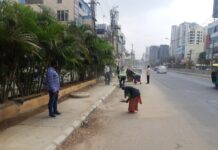
Mumbai, Twelve years after the sensational killing of Sohrabuddin Shaikh, his associate Tulsiram Prajapati and rape-cum-murder of Kausar Bi, a Special CBI Court here on Friday acquitted all 22 accused in the politically sensitive case, saying “witnesses and proofs provided were not satisfactory”.
“Witnesses and proofs the prosecution put forward were not satisfactory to suggest or establish the alleged conspiracy and murder in the 2005 encounter killing,” said Special CBI Judge S.J. Sharma, who also observed that “the documentary and circumstantial evidence was not substantial”.
The Special Judge also expressed regrets over the court’s inability to convict anyone in the case.
“I feel extremely sorry for the Sohrabuddin Shaikh’s family and Tulsiram Prajapati, especially his mother Narmadabai. The evidence before me could not establish the roles of any accused persons and no material evidence to prove any of the charges against the accused,” said Special Judge Sharma.
The much-awaited verdict, running into more than 500 pages in the case, came more than 12 years after the alleged ‘fake encounters’ of Sohrabuddin and his associate Prajapati, besides the rape-and-murder of Sohrabuddin’s wife, Kausar Bi.
“The CBI prosecution tried its best to prove the case. Unfortunately even after three chargesheets, the evidences were not substantial enough to prove the allegations beyond doubt. Despite three investigations, the evidence is lacking,” the Special Judge noted.
The 22 accused, including 21 lower police personnel, comprising 14 of Gujarat, six of Rajasthan, and one of Andhra Pradesh, have been absolved of all grave charges such as murder, conspiracy, and destruction of evidence.
They are: M.L. Parmar, Raman Patel, Balkrishna Choubey, Narayansing Dhabi, Jethusingh Solanki, Naresh Chauhan, Vinod Limbachiya, Ajay Kumar Parmar, Kanjibhai Kutchi, Shantaram Sharma, Ashish Pandya, Kiran Singh Chauhan, Karan Singh Sishodia, Vijaykumar Rathod (All Gujarat Police).
Shyam Singh Charan, Abdul Rehman, Narayan Singh Chauhan, Yudhveer Singh Chauhan, Kartar Singh Jat, Himanshu Singh Rajawat, (all Rajasthan Police), and Ghattamaneni Shriniwas Rao, Andhra Pradesh police.
The final acquitted (22nd) is Rajendra Kumar Jirawala, owner of the farmhouse outside Ahmedabad, where Kausar Bi was held captive for four days before she was eliminated.
According to the prosecution, the Gujarat Anti-Terrorism Squad (ATS) had gunned down Sohrabuddin on November 26, 2005, in an alleged staged killing.
Prajapati was also killed in a similar fashion on December 28, 2006, while Kausar Bi, who had witnessed the abduction of her husband (Sohrabuddin) was later raped and murdered.
The Special Judge debunked the story of Prajapati’s abduction, saying in its third chargesheet, the CBI claimed he was the third person travelling with Sohrabuddin and Kausar Bi on the Hyderabad-Sangli bus.
“However, the material evidences and witnesses establish he was not on the bus and was arrested from Bhilwara (Rajasthan) on Nov. 26, 2005,” Special Judge Sharma said.
These killings had kicked off a major political controversy in the Bharatiya Janata Party-ruled Gujarat, with allegations of the purported involvement of several top political bigwigs, IPS officers and other officials.
The prosecution contended that Sohrabuddin had connections with the Lashkar-e-Taiba and other terror groups and was conspiring to assassinate “an important political leader” presumably the then Gujarat Chief Minister Narendra Modi, the present Prime Minister.
A total of 37 accused were named in the case of whom 16 — mostly politicians and IPS officers — were subsequently discharged by the Special CBI Court in Mumbai and another by the Bombay High Court.
Among those discharged initially (2014) were BJP President Amit Shah, who was the Gujarat Home Minister at the time, the then Rajasthan Home Minister G.C. Kataria, high-profile ATS chief and DIG D.G. Vanzara, Superintendents of Police M.N. Dinesh and R.K. Pandian, among others.
Interestingly, after appeals from various quarters, the politically-sensitive trial was shifted from Gujarat to Mumbai by the Supreme Court in September 2012.
When the Special CBI Court recorded the statements of the remaining 22 accused during the trial, all claimed their “innocence” and said they were nabbed owing to rivalry among the Gujarat top police brass and related factors stemming from the then political situation prevalent in that state.
Of the 210 witnesses examined during the trial, 92 turned hostile, seriously undermining the CBI case, prompting the CBI counsel B.P. Raju to admit to ‘lacunae’ in the probe as the Sohrabuddin encounter took place in 2005, Prajapati in 2006, but CBI came into the picture only in 2010.








